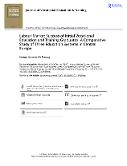Labour Market Success of Initial Vocational Education and Training Graduates: A Comparative Study of Three Education Systems in Central Europe

Publication date
2023Published in
Journal of Vocational Education and TrainingVolume / Issue
75 (4)ISBN / ISSN
ISSN: 1363-6820ISBN / ISSN
eISSN: 1747-5090Metadata
Show full item recordCollections
This publication has a published version with DOI 10.1080/13636820.2021.1931946
Abstract
This paper compares within-country programmes of initial vocational education and training (IVET) in Austria, the Czech Republic and Germany and their outcomes. Specifically, it aims to analyse and compare the labour market success of graduates of different tracks at the ISCED 3 level in both early and later stages of their careers. The comparison is based on the analysis of PIAAC 2013 OECD study data. A composite multidimensional indicator was constructed to measure labour market success and subsequently used as a dependent variable in regression models. The results indicate that in the systems with dual IVET at the ISCED 3 level (Germany and Austria), graduates are indeed more successful at the labour market than their counterparts with other ISCED 3 tracks. However, their advantage diminishes in later stages of the career. Additionally, in Austria, the success of dual education young graduates is mediated by individual characteristics. In the system with only school-based IVET (the Czech Republic), this track does not guarantee substantively higher labour market success for young graduates compared to other ISCED 3 tracks and also to those with lower education. Czech apprentices in the later stages of career succeed even less than those with below ISCED 3 education.
Keywords
Initial vocational education and training, apprenticeship, academic education, comparative study, labour market success
Permanent link
https://hdl.handle.net/20.500.14178/2455License
Full text of this result is licensed under: Creative Commons Uveďte původ-Neužívejte dílo komerčně-Nezpracovávejte 4.0 International






